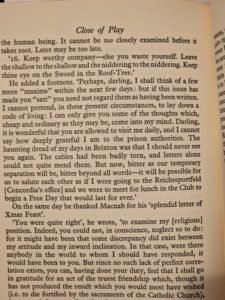 Whilst unjustly held against his will and imprisoned in Wandsworth Prison in London, the defiant National Socialist William Joyce sat down on December 27th 1945 and penned ‘a directory of life’ of which his wife had asked him for, although “as he protested again, he thought himself ill-equipped to do so.”[1]
Whilst unjustly held against his will and imprisoned in Wandsworth Prison in London, the defiant National Socialist William Joyce sat down on December 27th 1945 and penned ‘a directory of life’ of which his wife had asked him for, although “as he protested again, he thought himself ill-equipped to do so.”[1]
Joyce comments, ‘At a venture, from all the guides, directions, formulas and dispensations, the 10 Commandments and the Koran excepted, I would say I recommend the very hackneyed passage in Hamlet, Act I, Scene 3, when Polonius begins: “There, my blessing with thee!/And these few precepts in thy memory/Look thou character”. When I re-read it, I think it very cunning indeed. In comparison, these few crude suggestions that I uncouthly and most incompletely set down are not likely to draw much admiration. But here goes.‘[2]
The following which I have transcribed is William Joyce’s 16 point ‘Directory of Life’ of which until today has not appeared online and sadly all but forgotten.
- Life has a purpose or it is nonsense. For many it is nonsense: but for you it is purposive: and your first duty is to serve, as best you can, the Omnipotent Omniscient—the Super-Relation of all Relations.
- Self-deception is the commonest and the most dastardly sin of all.
- All humans are fallible and the best imperfect. Find another’s coefficients of deception, self-deception, and unreliability: estimate your own: and then a practicable basis of social relationship with the other exists.
- Coition is a commonplace, not an achievement: a personable woman has no need to be proud of inducing a male creature to lie with her, after lying to her. In sex, the aristocracy of selection is sound, the democracy of promiscuity rotten.
- Do not seek to win the admiration of others. Deserve it: and if they fail to give it, mark them down as fools.
- A personable, and—a fortiori—a beautiful woman must realize that the greatest pleasure she can give to many of her female acquaintances is to fall into misfortune. If they can contribute to her distress, so much the better. When they see her broken, they will flatter themselves on their wisdom and expect thanks if they stop to pick up the pieces.
- Punctuality is a form of troth-keeping. To be late is to be either rude or inefficient. We live in Time: let time then be honoured as a prime function of consciousness.
- Good works are the sole justification for existence.
- Most people judge by the superficial. Reserve is, then, a good protective mechanism. Never be as familiar as you could be if you wanted.
- Never give offence unintentionally.
- Attainment breeds not satisfaction but desire.
- Have little respect for learning. What one man can acquire of it is too little to be admired. Character is, in any case, more important than intellect.
- The border between moderation and excess is the locus of the greatest sensuous pleasure.
- A lie is more honest than equivocation.
- Know your motives surely before you act. Once a motive is firmly adopted, it may twist reason and sentiment to suit itself. Indeed, the motive is the most primitive and powerful factor in the human being. It cannot be too closely examined before it takes root. Later may be too late.
- Keep worthy company—else you waste yourself. Leave the shallow to the sallow and the niddering to the niddering. Keep thine eye on the Sword in the Roof-Tree.[3]
Cole states that Joyce added a footnote, ‘Perhaps, darling, I shall think of a few more “maxims” within the next few days: but if this issue has made you “satt” you need not regard them as having been written. I cannot pretend, in these present circumstances, to lay down a code of living: I can only give you some of the thoughts which, cheap and ordinary as they may be, come into my mind…'[3]
NOTES
1] Cole, J.A.; Lord Haw-Haw & William Joyce: The Full Story, Chapter 32: Close of Play, Farrar, Straus & Giroux, 1965, pg. 294.
2] Ibid
3] Ibid., 294-296.
